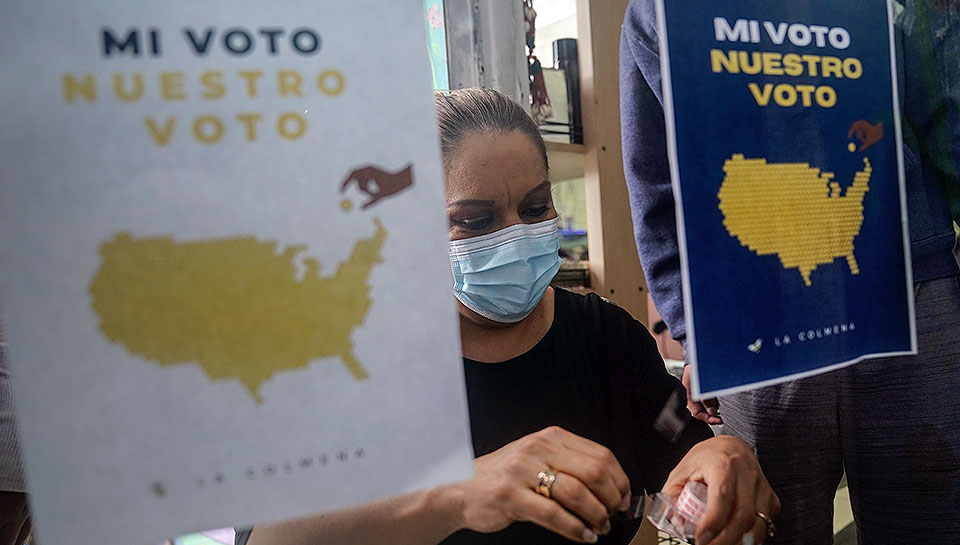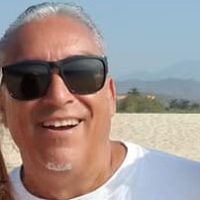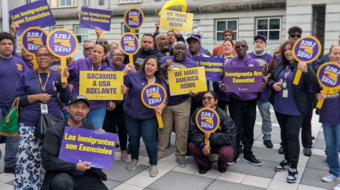
In this election cycle, politicians testified that a change in our country is needed. They claimed that a change would come. For years the Latino community has been waiting for this change to happen. Our community is uniquely aware that not much has changed in the streets and neighborhoods in which we live. There needs to be a change!
Unfortunately, there is a saying, “The more things change, the more they remain the same.” The election may be past us, but there is still a lot of community organizing work ahead.
Soon a new president will be sworn in. The nation faced one of the most divisive elections in modern history in what seemed like an electoral nightmare. On election day millions of American voters cast their ballots. Each state had its own particular voting process and its protocol for finalizing the count and verifying the vote. Finally, the election was called. The Biden-Harris Democratic team had won the election for President and Vice-President. President-elect Biden won not only the popular vote (like Hillary Clinton four years ago) but this time he had enough Electoral College votes to claim victory—ironically, the same 306-232 divide that four years ago Trump called a “landslide.”
Numbers are now being crunched. Voter exit polls, mail-in ballots, and election-night turnout are currently being analyzed. Black voters, Latino voters, Indigenous voters, women voters, white male and female voters, religion, sexual orientation, rural/urban, income, are all being scrutinized. Decisions are being made in both parties about how to best approach any upcoming elections. Yes, there is already talk about the next presidential election in 2024.
Many political activists and analysts will undoubtedly find deeper quantitative and qualitative conclusions as the data become more available and more reliable. Political pundits from every sector of society are all throwing themselves into this debate of vetting wins and loses, asking how and why. This chatter around analysis has little direct impact on the Latino community. The ongoing political analysis does have its purpose, however.
It’s not that the Latino community isn’t concerned about the outcome of all this granular attention devoted to election data. It’s not that the Latino community isn’t concerned about the state of our nation or the actions to overturn the will of the people by a fascist coup attempt, now seemingly averted. In fact, this is the major reason why Latinos overwhelmingly voted for a change. But the reality is that the Latino community is part of the working class. And the working class must work in order to survive. This is their main focus.
So many in the Latino community need to get back to work—oftentimes working 12 hours a day just to survive. Many have to work two jobs just to live above the poverty line. Maids, janitors, mechanics, restaurant workers, cooks, teachers, truck drivers, grocery workers, gig workers, farmworkers, and every other kind of worker all need to be employed in order to stay alive. This is one way capitalists take advantage of the working class. They divert attention from politics by forcing the working class to increase the time they require to maintain their livelihoods while lessening the time they can spend participating in civic life and the political process.
So much more needs to done
Generations of Latinos have lived their lives in America as outcasts, often ignored, and viewed in superficial terms in the political arena. There have been some inroads in politics and in community economic power. But there is so much more that needs to be done to improve the working and living conditions of many Latino families.
COVID-19, and the unemployment it has brought, is a destructive force in the Latino community. Deaths are mounting every day. Unemployment creates uncertainty and stress. How are we going to pay the rent? Latino students are falling further behind in their education. Inequality in income is creating a working-poor underclass, and the poor are not benefiting from any economic policies. Toxic communities remain an environmental tragedy in Latino communities. The glass ceiling has always been an obstacle for Latinas and still holds true today. Pay inequality is nothing new to Latinos. Police still place Latinos under suspicion at every turn. Society’s ill-informed, racist treatment toward the Latino continues. Discrimination is alive and well in America today.
Latinos are incarcerated at a higher rate than other groups, and ICE is still threatening the Latino community. Stop and frisk has never really been put to rest. It is now just racial profiling. Inadequate health care remains a major concern. Workplace and Latina sexual harassment is rampant in our society, an issue that has been kept silent for far too long.
Racism remains a serious issue for this nation. For the past four years, racist messaging has become the norm. Attacks on the Latino community have intensified—but even before the Trump years, Latinos had to face racism on a daily basis.
This election will not solve all the major issues facing the Latino community, nor will this one election be a magical force in solving systemic inadequacies. Many people don’t want to speak about this reality: They don’t want to hear this truth.
This sad fact, however, should only encourage Latino activists to deepen their resolve to create a better society, and better neighborhoods. Recent history shows that the Latino community will do everything possible not to lose the economic and political ground gained over the past decades.
The historic 2020 election has shown the potential for unified action to move our nation forward on many fronts. But action—and activism—must be constant and continue to evolve. The incoming Biden administration will be a positive start in challenging everyone to seek a better way of dealing with our nation’s problems. The new administration will, hopefully, allow for further positive advancement in addressing issues facing the Latino community.
A Latino call to action
Latino activistas have voiced an even higher standard of participation in community and political organizing. Here are some actions that activists can take to continue building community and political empowerment. This is especially important to the Latino community in order to secure a future without another threat of a fascist attempted takeover, as the nation keeps in mind that despite everything, Trump still maintained his base with an unprecedented second-highest presidential vote in history (!), only surpassed by Joe Biden.
- Activists must continue to build on grassroots outreach and organize.
- Connect and work with other community progressive organizations.
- Mobilize individual neighborhoods based on community needs and local issues.
- Develop local social media outreach plans and develop political messages.
- Encourage and seek out ways to support progressive local candidates.
- Engage local labor leaders, elected politicians, and business leaders about community issues. Let them hear our concerns and yes, our demands.
- Seek local collective leadership and planning (neighbor to neighbor).
- Regroup and continue voter education and registration.
- Keep in constant contact within neighborhoods by any means necessary.
- Activists should reinforce the idea that we are all leaders.
The election of Joe Biden and Kamala Harris as president and vice-president is our victory. Pushing for systemic changes in our society is our challenge. Latinos are in the struggle. Many Latinos sacrificed so much over the years, especially the past four years. We are a community of voters. The will of the people will not be denied. We are part of the working class, not separate and apart from the working class. That is why la lucha continua—the struggle continues.
As with all op-eds published by People’s World, this article reflects the opinions of its author.










